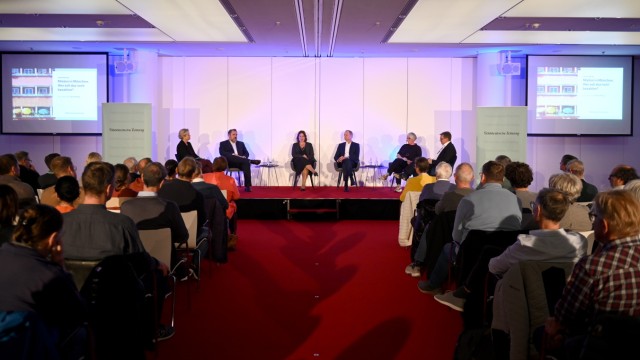To illustrate what she sees as a really big problem, Ariane Groß takes accessibility into account. “Do we really need accessibility in 100 percent of new apartments?” she asks. Groß doesn’t even have to say that from her point of view the answer is “no”, everyone in the room knows that. Because: “That costs a lot of money.” Of course, the cooperative representative Groß would never doubt that barrier-free apartments are extremely important in new buildings. For her it’s just about the proportion – and overall she’s concerned about the requirements that builders have to meet: “Does what we’re building at the moment really make sense?”
Because high construction costs naturally also drive up rents for apartments. And that’s what a discussion in the “SZ in Dialogue” series is about this Monday evening. “Rent in Munich. Who else is going to pay for it?” is the title of the event, which takes place in the Süddeutscher Verlag high-rise and is moderated by Ulrike Heidenreich and René Hofmann, head of the Munich, Region and Bavaria department. A week earlier, the real estate association IVD presented new figures on the situation on the Munich rental market: According to this, the costs for newly rented existing apartments rose by 4.3 percent within six months, to 19.50 euros, and in new buildings even by more than five percent to 22.40 euros.
FDP politician Daniel Föst, Mayor Verena Dietl, Rudolf Stürzer from Haus und Grund and cooperative representative Ariane Groß (from left) discussed at the Süddeutscher Verlag.
(Photo: Stephan Rumpf)
Ariane Groß, board member of the Cooperative Real Estate Agency (Gima), represents the interests of community-oriented housing companies in the group. She directs her appeal for fewer regulations primarily to politicians, represented this evening by Munich’s Third Mayor Verena Dietl (SPD) and the FDP Bundestag member Daniel Föst – both of whom made one or two comments from Rudolf Stürzer over the course of the evening. Head of the owners’ association Haus und Grund Munich.
The group largely agrees that building new apartments quickly is a necessary means of taking at least some pressure off the rental market. And because factors such as interest rates and construction costs can hardly be influenced politically, the real estate scene is actually increasingly discussing construction requirements. “It’s better to have more apartments faster than always have the perfect standard,” is Mayor Dietl’s credo. She is also chairwoman of the supervisory boards of the municipal housing companies GWG and Gewofag, which will soon merge to form “Münchner Wohnen”. When she hears about new project ideas there, Dietl reports, “I always say: decide quickly and build.”
The liberal Föst is happy to take up the ball that Ariane Groß has rolled into the field and puts forward the theory that perhaps it could be enough to “first” plan the ground floor and the first two floors barrier-free in a new building project, “the apartment “The eighth floor may no longer have to be barrier-free.” He himself states that because of noise protection, the thickest and therefore most climate-damaging floor ceilings are built in Germany and that he would like to adopt the somewhat more liberal fire protection regulations from Austria, “there are just as few deaths from fire there as here.”

The discussion in the “SZ in Dialogue” series dealt with the adjustment screws for cheaper rents in Munich.
(Photo: Stephan Rumpf)
But wouldn’t it then be up to him, his FDP and the traffic light coalition in Berlin as a whole to change the conditions? Yes, we’re already on it, says Föst. But all the details are regulated in 16 different building regulations of the federal states. He very much hopes that the conference of building ministers of the federal states can quickly agree on a few common standards. And Föst thinks even further: “A uniform building code would be a dream.”
“I’m not a fan of the right of first refusal”
Rudolf Stürzer from Haus und Grund draws attention away from new construction, which produced an average of 7,740 completed apartments from 2017 to 2022 – many expect the number to fall in the coming years due to the real estate crisis. Stürzer argues that new apartments on the open market are so expensive because of the land and construction costs that they would only be offered at astronomical rents anyway. According to Stürzer, of the 830,000 apartments in Munich, around 600,000 are rented. He draws the conclusion: “If you want to keep rents affordable, you have to look at the inventory.” And the representative of landlords observes that his clientele is “very excited”.
He sees upcoming investments in the renovation of heating systems as the main reason for the uncertainty. According to Stürzer, a long-standing concern – and particularly virulent due to land prices in Munich that have quadrupled in ten years – is inheritance tax. Anyone who inherits a property is often forced to sell it to pay the tax. Such factors would “drive small landlords with moderate rents out of the market,” says Stürzer. They would then be replaced by commercial investors who are only interested in maximizing returns.
FDP MP Föst also sees the inheritance tax as a “problem”. In Berlin, his party tried to impose higher tax allowances if apartments were rented cheaply, “but we don’t yet have a political majority for that.”
The question of who houses will end up with when they are for sale is one that concerns SPD politician Dietl. She is concerned with the right of first refusal in protected areas, which has been largely undermined by the Federal Administrative Court. The SPD and the Greens want to make this possible again by changing the law, but the FDP is putting the brakes on it. “I’m not a fan of the right of first refusal,” replies Föst, “it’s very expensive and I lack social control.” Those who happen to live in the right apartment, no matter how much they earn, benefit from such purchases by the city and the low rents they then secure. Instead of sinking money into the right of first refusal “The city should build more new buildings, says Föst. Dietl responds that the municipalities can best decide for themselves how to spend their money, so the federal government should give them back the instrument of the right of first refusal in the form it was.
The debate about housing costs always involves many adjustments that are sometimes the responsibility of the city, sometimes the state, sometimes the federal government and sometimes the EU, which is what makes the solutions so difficult. But Ariane Groß from Gima, whose members rent out around 40,000 apartments, also spreads optimism despite her criticism of the requirements and despite the difficult conditions on the real estate market: The significantly increased funding from the city and the Free State in recent months “will bring us in regions where we can get back into building.”
She refers to a recently published “rent atlas” in which housing stocks of Gima members, but also the municipal GWG and Gewofag, are recorded. In these 150,000 apartments recorded, the average rent is just under eight euros. The group agreed that Munich could really use more rental agreements in these regions.

